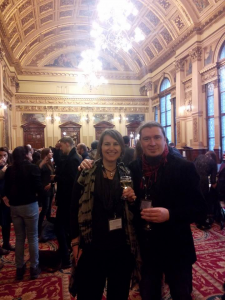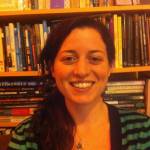“Societies in Transition: Progression or Regression?” British Sociological Association (BSA), University of Glasgow, 15-17 April 2015. Conference report for The Religious Studies Project by Rachel Hanemann.
The British Sociological Association’s conference was held this year at the University of Glasgow. The conference theme was “Societies in Transition: Progression and Regression, although many of the papers I saw raised questions about transition, but showed a sociologist’s reticence to comment on the positivity or negativity of one’s observations.

The three keynote lectures centred on underprivileged or oppressed groups in transition. Alice Goffman (University of Wisconsin-Madison) spoke about her book On the Run, exploring the criminalization of young black men in the United States. Colin Samson (University of Essex) spoke on “The Idea of Progress and Indigenous Peoples: contemporary legacies of an enduring Eurocentric prophecy”, examining the historical treatment of non-European indigenous peoples at the hands of European ideas of progress. Samson then used this historical lens to discuss the contemporary situation of the Innu peoples of the Labrador-Quebec Peninsula in Canada. Guy Standing (SOAS, University of London) spoke on “The Precariat’s Magna Carta: from denizens to citizens”, outlining a “Precariat Charter” for today’s precariat, a class of millions of people experiencing a diversity of insecurities and being denied identity.
As always, the streams and papers featured at the BSA were varied and numerous. Although it was impossible to see them all, one highlight for me was the Sociology of Religion stream, particularly those papers that proposed new methods or areas of research. Titus Hjelm’s (University College London) talk, “Towards a Discursive Sociology of Religion and the State”, proposed a “discursive sociology” approach to religion-state relations, broadening the focus from legislative outcomes to the act of legislation, the discussions, processes and negotiations that produce policy outcomes. Peter Hemming (Cardiff University) spoke on “Faith-Based Schooling in Rural Communities”, pointing out that larger discussions about urban, multi-faith school communities exclude the small, rural Anglican primary schools that make up the majority of faith-based schooling in the UK. Tim Hutchings (Durham University) spoke on “The Bible in (Virtual) Community: Accountability in Digital Religion”. Hutchings first summarised the findings from his research on the Youversion Bible App, before asking questions about religious authority online. The Scoiology of Religion stream plenary featured Steve Bruce (University of Aberdeen) speaking about the decline of religion in Britain.
The Race, Ethnicity, and Migration stream on Islamophobia also bears mention. Shamim Miah (University of Huddersfield) discussed “Trojan Horse and the Racial State: Race, Religion and Securitisation”, arguing that the Trojan Horse controversy led to the embedding of a particular secularization agenda in Britain’s schools. Aurélien Mondon’s (University of Bath) and Aaron Winter’s (University of East London) talk, “Breaking Taboos or Strengthening the Status Quo: Islamophobia in the Name of Liberalism in France and America” presented a fascinating account of the role of liberal Islamophobia, which couches attacks on Islam in a pseudo-progressive position of protecting liberal freedoms, in political and cultural discourse in France and America, as well as in the UK. Finally, Tania Saeed (University of Oxford), spoke on “Islamophobia: Experiential Accounts of Pakistani and British Pakistani Muslim Women in England.” Her talk focused on the individual lived experience of a number of women, highlighting the intersection between race, ethnicity, and religion in public perception. The three papers worked well together as commentaries on Islamophobia at the levels of legislation, media and public discourse, and individual experience.
Pierre Bourdieu’s work was heavily present at this year’s BSA conference, as numerous Twitter discussions of “theorist BINGO” pointed out. The Sociology of Education stream featured a panel on the application of Bourdieu’s habitus to the social sciences, in which Cristina Costa (University of Strathclyde), Cirian Burke (Ulster University), Alan France (University of Auckland), and Mark Murphy (University of Glasgow) offered methodological examples of the application of a Bourdieusian framework from their own research on education. In the Sociology of Religion stream, M. Angelica Thumala Olave (University of Edinburgh) presented her work with Susie Donnelly (University of Edinburgh), asking “With or without Bourdieu? The Uses of His Approach for the Study of Religious and Cultural Change”.
The Presidential event, held at the end of the final day, asked the question, “Is there a British society?” President Lynn Jamieson (University of Edinburgh) chaired a panel of Michael Rosie (University of Edinburgh), Nasar Meer (University of Strathclyde), Ann Pheonix (IOE, University of London), and Aaron Winter (University of East London), who gave brief responses before opening the discussion to the floor. Ann Phoenix effectively summed up the discussion with her response, “Is there a British society? Yes…there are many!”



